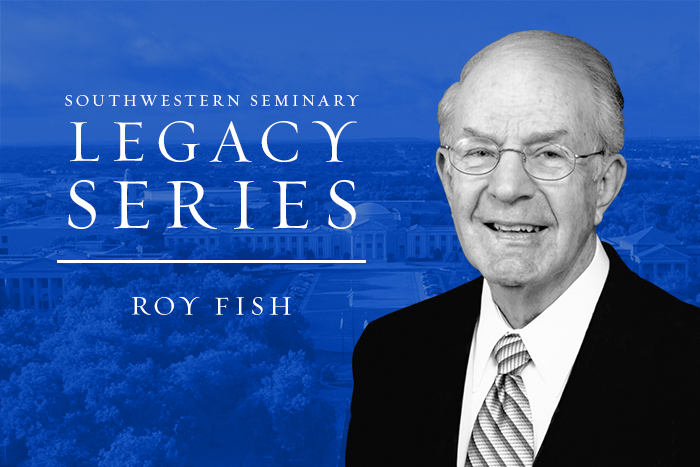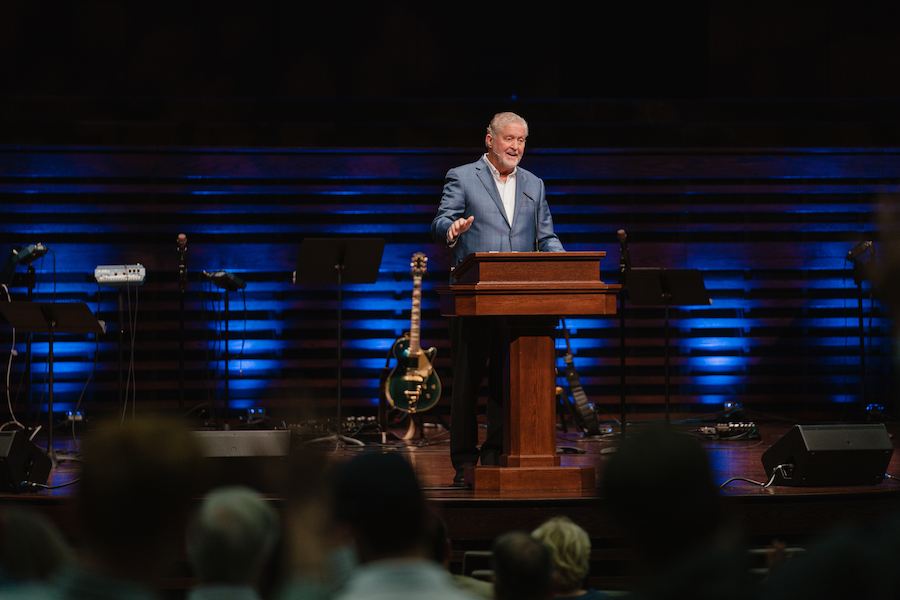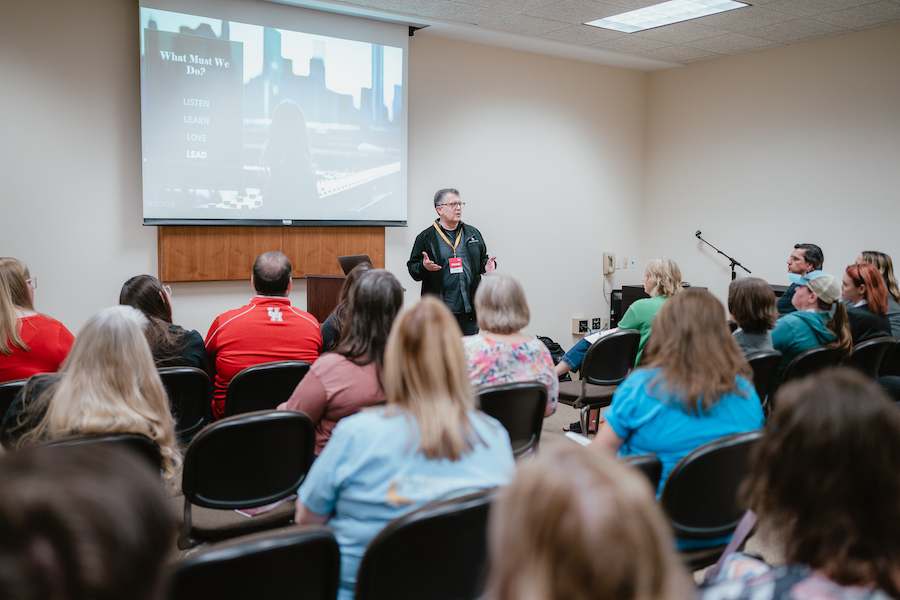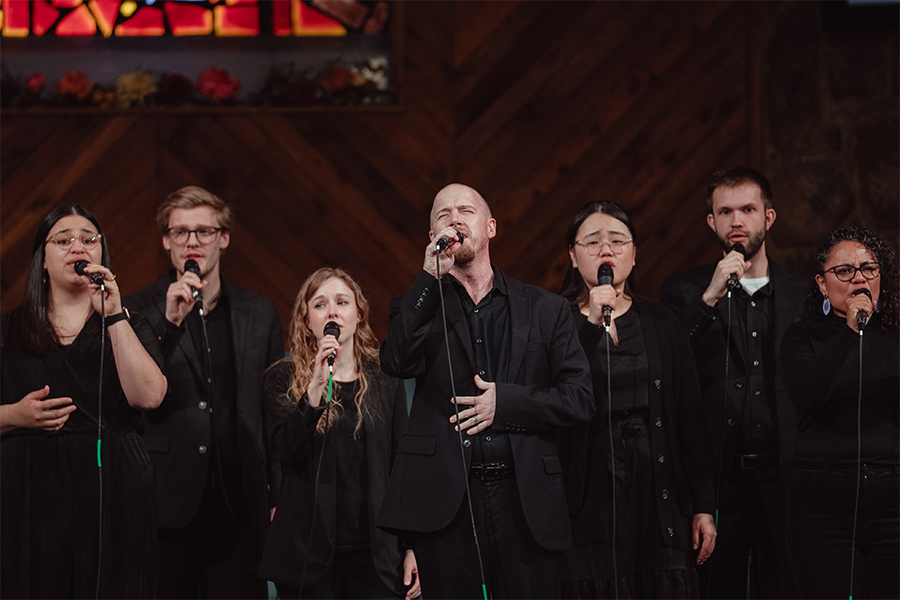SWBTS Legacy: Roy Fish


The last thing Roy Fish said to his students before dismissing class and heading to the airport was, “Make yourself available to God. He wants to use you to touch the life of somebody else.” That evening, he shared a similar message with a west Texas church, impressing upon them the importance of witnessing for Christ.
At around 11 o’clock that night, Fish was challenged to practice what he preached. While eating a late dinner at the restaurant of his hotel, he saw a man “with an unusually shaped beard” and thought to himself, “Here is a man with whom I should share.” Looking at his watch, however, and seeing that it was nearly midnight, he rejected the thought.
After paying the check, Fish walked into the lobby and found himself advancing toward the man with the beard. Again, he sensed the need to witness to this man, but again, he protested, citing once more the lateness of the hour.
Fish went outside for a breath of fresh air. Upon returning indoors, he stepped onto the elevator, and there, yet again, he found himself in the presence of the man with the beard. Fish seemed to hear God say, “Are you available?”
Reluctantly, Fish removed a pamphlet from his pocket—one produced by the Billy Graham Evangelistic Association. He handed it to the man, who was reading a newspaper, and said, “Here is some good news that you won’t read in today’s newspaper.”
The man took the pamphlet and, seeing Billy Graham’s name, revealed that he had once attended one of Graham’s evangelistic crusades. “Although he found it stirring,” Fish learned, “he left lost, as he had arrived, but hungry to know more. Billy Graham’s name on the pamphlet rekindled that hunger.”
The next morning, the man accepted Jesus as his Savior. He later became an active member of a Baptist church in New York, sharing his faith with others as Fish had done with him.
Recounting this story in his book Dare to Share, Fish said, “Suppose [I] had not been available to God. Then ask yourself this question, ‘How many people are there who are just waiting for some available witness to dare to share the Gospel with them?’
“The Holy Spirit is looking for available channels. Will you be one?”
This illustrative experience typifies Fish’s life ministry. Since becoming a Christian in his college years and engaging in personal evangelism for the first time soon thereafter, he sought to not only be an available witness for the Lord himself, but also to teach and encourage others to do the same.
“Sharing is to be a part of our constant lifestyle,” he said. “Wherever we come in contact with people, the place becomes a potential place of sharing. Anyone with whom we come in contact possibly could be a hurting person—one with whom God would have us share.”
Roy Jason Fish was born on Feb. 7, 1930, in Star City, Ark. Growing up in church, he was baptized at age 9, but he later realized that he had not truly made a profession of faith, instead thinking that the way to heaven was to join the church, be baptized, and live as good a life as possible. Not until 10 years later, in July 1949, did he finally understand that all of his own efforts toward Christianity had come to nothing; that he had neither deserved nor earned salvation, but could only accept it as Jesus’ free gift.
Recalling the words of a hymn sung in church the previous Sunday—“Only Trust Him”—Fish prayed to the Lord, “I trust you as Savior and will trust you to take me to heaven.” Fish’s life was forever changed.
Later that summer, Fish shared his testimony at a citywide youth revival. The following day, his cousin invited him to join him in visiting some friends from high school and college in order to witness to them. Though nervous to do so, Fish accepted the invitation.
Fish’s son, Steve, recalls the experience: “The friends and their families who opened doors at their knocking looked at those Bibles as one might a loaded canon, and it seemed that no one in that particular venture was saved by their witness. However, in a few days, he began to go out alone to see some of his old friends in an effort to win them to Christ. That invitation to go visiting was the beginning of Roy Fish’s lifelong practice of telling others about Jesus.”
Fish proceeded to serve in his college’s Baptist Student Union, and later worked on staff at Ridgecrest Baptist Assembly in North Carolina. He also began preaching revivals and taking pastorates at local churches. He eventually enrolled in Southwestern Baptist Theological Seminary, finishing his Bachelor of Divinity in 1957 and his Doctor of Theology in 1963. Here, he met his wife, Jean, and they were married on June 11, 1960.
Between his bachelor’s and doctoral studies, Fish worked as a full-time evangelist, but upon beginning his second degree, he reentered the pastorate. While pastoring Live Oak Baptist Church in Gatesville, Texas, Fish received a clear call from the Lord that would not only affect the direction of his life, but also impact countless men and women who had been called to ministry.
“I was walking down a country road one Saturday night, thinking about my Sunday morning message,” Fish later recalled. “It was dark, and I found myself aware of the Lord’s presence. I started thinking about my reasons for working on a doctorate at Southwestern, and I suppose I asked out loud why I was beginning this advanced degree. It was almost as if the Lord Himself spoke audibly, saying, ‘You are doing this because some day you will be teaching evangelism at Southwestern Seminary.’”
In 1965, then-president Robert Naylor offered Fish a position on Southwestern Seminary’s faculty as a professor of evangelism. Considering this position one of the most strategic in the Kingdom of God, Fish gladly accepted and proceeded to serve at the institution for nearly 50 years, impacting the lives of thousands of students.
“In training young men and women to share the Gospel,” Steve Fish said, “Dad found a calling in which God sustained him and our family with an inner blessing and vigor.”
As an evangelism professor, Fish, who once occupied the seminary’s Chair of Evangelism (“Chair of Fire”), instilled in the souls of thousands of God-called men and women a fire for evangelism. For many years, he also organized the annual Spring Break Revival Practicum (now called Revive This Nation), deploying hundreds of student preachers across the United States to preach revivals in local churches. He also wrote several evangelism resources for use in both the church and the classroom, including Dare to Share and Giving a Good Invitation.
“Few men have ever stood with more integrity and consistency over a lifetime,” says Jimmy Draper, former president of LifeWay, who sat under Fish’s preaching. “Whether as a pastor, a seminary professor, a conference speaker, or a friend, Roy Fish [was] God’s instrument to motivate several generations to accept the challenge of the Great Commission.”
“Perhaps no person in human history has taught evangelism to more ministerial students than Roy Fish,” says Steve Gaines, pastor of Bellevue Baptist Church, who worked as a grader for Fish while a student at Southwestern Seminary. “… Through his preaching, writing, and teaching ministries, Fish has impacted a host of Christians and has encouraged and inspired them to sow the seed of the Gospel that they might reap the conversion of lost souls for Christ’s glory.”
Fish continued to preach revivals, fill interim pastorates, speak at conferences and convention meetings, and remain a personal soul-winner, but for the final 50 years of his life, he focused on encouraging others to be available witnesses for the Lord. When Southwestern Seminary later launched a school of evangelism and missions, it was named in honor of Roy J. Fish.
One oft-shared illustration reveals Fish’s heart for evangelism. As an infant, Fish’s son was chronically ill. One night, his cries awakened his father, so Fish took his infant son from his crib, gave him some medicine, and then rocked him back to sleep.
As he looked down at the precious face of his beloved son, Fish was struck with an alarming thought: “Suppose our little boy should die? Suppose God should choose to make heaven richer by taking my son home to be with Him?”
As tears filled his eyes, Fish pondered why he felt this way. “It’s not because I know this little fellow well, and he hardly knows me at all. Until a few months ago, he couldn’t even recognize me in a crowd.”
“Besides that,” he continued, “we’ve never even had a conversation. I don’t know how well we are going to get along.
“On top of that, there hasn’t been a single night at home that he hasn’t wakened me at least once and usually twice. Why should I care so much if this precious little bit of human flesh and spirit should go to be with God?”
Initially unable to articulate an answer to this question, Fish probed the matter, searching his soul for the reason. Finally, he discovered it: He realized that if his son should die at age 1, he would never know how much his father loved him.
The thought of this happening nearly broke Fish’s heart.
Relating this story in Dare to Share, Fish said, “Love is like that, isn’t it? Love desires to communicate. Love desires for response.”
Applying this to the witnessing task, Fish concluded, “There is a Father in heaven who loves people so much that He sent His only Son to die on a cruel Roman cross for them. He loves every person. He wants every person to know about His love.
“God’s love is like that. He desires people to know about it. But they will not know about it unless they hear about it from you and me. Our sharing is God’s way for others to know about His love.”
Fish used this illustration in his writing and preaching to provide insight into the character of God, who grieves because the lost who die without Christ never know how much He loves them. This experience taught Fish the importance of being an available witness for the Lord, and he shared the experience with others that they might do the same.



